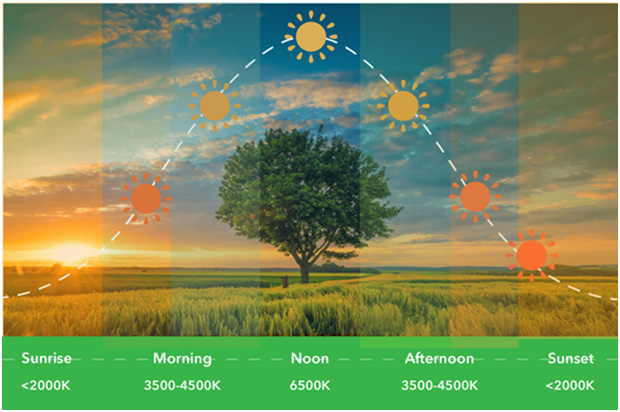Rotate the life clock-natural light and human biorhythms
In 1972, scientists identified the Suprachiasmatic Nucleus (SCN) in the hypothalamus as the central biological clock that coordinates circadian rhythms in mammals by destroying neural tissue. It is responsible for sensing the changes of light in the external world and transmitting the time information of light to the peripheral organs in the form of hormones and signals from the autonomic nervous system, and keeping the Peripheral Clock of the whole body in the same rhythm as the Central Clock for the healthy functioning of the human organism.
The light and dark changes of the sun are the most powerful influences on the endogenous rhythm of life. The circadian rhythm, with a cycle close to 24 hours, is involved in regulating many important physiological processes in the human body, controlling the daily cycle of sleep, waking, eating, body temperature, hormone secretion, metabolism and other physiological activities.

The daily variation of the light and dark cycle of natural light is the most important timing factor of biological rhythm, and the variation of the intensity and time of sunlight stimulation in the early morning and evening of different seasons also affects the biological rhythm and makes human physical and mental health show seasonal correlation.
For example, the early sunrise and high intensity of sunlight in summer make the circadian phase of human body earlier than other seasons, and even under the same indoor temperature, human body sleeps shorter and wakes up earlier in summer than other seasons.
Seasonal Affective Disorder (SAD) strikes at the same time every year, starting in late fall/early winter and ending in late spring/early summer, and is more prevalent in high latitudes where seasonal changes are evident.

Obesity, many cancers, neurodegenerative pathologies, and psychiatric disorders are all highly associated with rhythm disorders. The results of two U.S. clinical trials have shown that rhythm disorders seriously disrupt the dynamic balance of glucose levels in the body, affecting the regulatory effects of insulin and appetite control.
Therefore, people should learn to pay attention to the interaction mechanism between biological rhythms and human health while they are busy, follow the natural circadian rhythm, choose a healthy lifestyle, enjoy the sunlight during the day, experience the darkness at night, and work and rest with the sun.

In 2017, three geneticists from the United States, Jeffrey Hall, Michael Rosbash and Michael Young, were awarded the Nobel Prize in Physiology or Medicine for ”discovering the molecular mechanisms that control circadian rhythms.” They isolated from Drosophila a specific set of genes, named Period gene, whose mRNA and protein levels vary in a circadian rhythm, with lower concentrations during the day and higher concentrations at night. Through further in-depth study, they discovered more genes related to biological clocks and their production and operation mechanisms. This is an explanation of biological rhythms from a genetic perspective.

